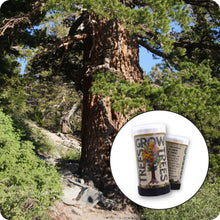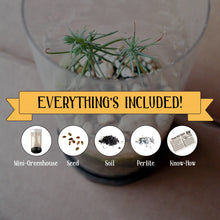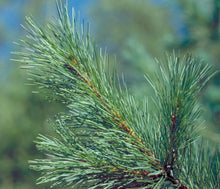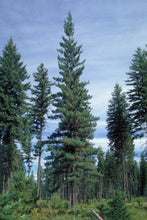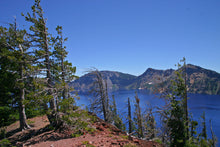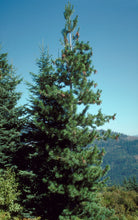
-
Grow your own Western White Pine, a handsome, fast-growing tree from the Western United States and Canada!
- Includes absolutely everything you need to grow Western White Pine (Pinus monticola) from seed: seeds, growing medium, a mini-greenhouse, and detailed instructions
- 100% guaranteed: If your seed fails to germinate or your seedling perishes, we are happy to provide free replacement seed
- Great for kids and adults, amateurs to experts!
- A universal symbol of life, regrowth and recovery, enduring friendships and new beginnings, a tree is a wonderful gift that will only grow in value, meaning, and beauty
About Western White Pine
Western White Pine (Pinus monticola) is closely related to Pinus strobus, Eastern White Pine, but the Western version is denser, narrower, and larger, with stiffer needles and bigger cones. Western White Pine grows in the Pacific Northwest (Washington, Oregon, and Northern California), British Columbia, and east into Idaho and Montana, where, prior to over-logging, it reached its greatest size and grew in its most impressive forest stands. Western White Pine is the State Tree of Idaho, and is known by many names, including Idaho White Pine, Fingercone Pine and Silver Pine.
Like its Eastern cousin, this tree sports bundles of 5-needles (2 to 6-inches long) with white undersides — contributing the color from which the tree gets many of its common names. In form, Western White Pine has a narrow crown composed of regularly spaced horizontal branches with ascending tips, all built around a dark, silvery-black trunk, straight and slender. The tallest Western White Pine was a giant towering nearly 300 feet into the sky with an 8 foot diameter trunk. The cones of Western White Pines are often collected as novelty items — they can be up to 15 inches long and look like giant bananas.
Once yielding the preferred wood for matches and toothpicks and hundreds of other uses, Western White Pine is no longer the major timber tree it once was, although its straight-grained, non-resinous, lightweight wood exhibits great dimensional stability and is thus still favored for making patterns, windows, doors, sashes, and other items requiring exacting measurements and stability. Native peoples also made great use of Western White Pine, chewing its resin, weaving baskets from its bark, and using other parts of the tree for medicine and food. Western White Pine grows rapidly to a large size, and makes a handsome ornamental for capacious yards and gardens.
Like its Eastern cousin, this tree sports bundles of 5-needles (2 to 6-inches long) with white undersides — contributing the color from which the tree gets many of its common names. In form, Western White Pine has a narrow crown composed of regularly spaced horizontal branches with ascending tips, all built around a dark, silvery-black trunk, straight and slender. The tallest Western White Pine was a giant towering nearly 300 feet into the sky with an 8 foot diameter trunk. The cones of Western White Pines are often collected as novelty items — they can be up to 15 inches long and look like giant bananas.
Once yielding the preferred wood for matches and toothpicks and hundreds of other uses, Western White Pine is no longer the major timber tree it once was, although its straight-grained, non-resinous, lightweight wood exhibits great dimensional stability and is thus still favored for making patterns, windows, doors, sashes, and other items requiring exacting measurements and stability. Native peoples also made great use of Western White Pine, chewing its resin, weaving baskets from its bark, and using other parts of the tree for medicine and food. Western White Pine grows rapidly to a large size, and makes a handsome ornamental for capacious yards and gardens.
About Jonsteen's Grow Kits
Growing a tree from seed is a magical and fascinating experience for people of all ages. Our 100% guaranteed Grow Kits provide everything you need to germinate some of the world's largest and most interesting tree species from seed — seeds, growing medium, a mini-greenhouse, and detailed instructions, which lead you through the whole process, from cold-stratifying your seeds to germination and transplanting.
About Jonsteen's 100% Guarantee
If your seed fails to germinate or your seedling perishes, we are happy to provide free replacement seed. We encourage all customers experiencing difficulties growing their trees to contact us through our toll-free "Tree Help Line" (1-888-387-3379).






